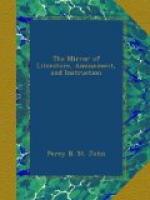MANNERS & CUSTOMS OF ALL NATIONS.
No. XIII.
* * * * *
SINGULAR JEWISH CUSTOM.
Burckhardt, in his “Travels through Syria,” &c. informs us, that at Tiberias, one of the four holy cities of the Talmud, the Jews observe a singular custom in praying. While the rabbin recites the Psalms of David, or the prayers extracted from them, the congregation frequently imitate, by their voice or gestures, the meaning of some remarkable passages; for example, when the rabbin pronounces the words, “Praise the Lord with the sound of the trumpet,” they imitate the sound of the trumpet through their closed fists. When “a horrible tempest” occurs, they puff and blow to represent a storm; or should he mention “the cries of the righteous in distress,” they all set up a loud screaming; and it not unfrequently happens, that while some are still blowing the storm, others have already begun the cries of the righteous, thus forming a concert which it is difficult for any but a zealous Hebrew to hear with gravity.
CHARACTER OF THE KARPIANS, (ARABS.)
They are such consummate thieves and rogues, that, according to an ancient tradition still current among them, they once tricked the devil himself. The story is as follows:—The devil had acquired a right to their fields, on which they agreed with him, that when their crops were ripe, they should retain the upper part and the devil should have the lower. They sowed all their lands with wheat, and the devil of course had nothing but the straw for his share. Next year the old gentleman, fully determined not to be again so bamboozled, stipulated that the upper part should belong to him and the lower to the Karpians; but then they sowed all their grounds with beet, turnips, and other esculent roots, and so the devil got nothing but the green tops for his portion.
Memoirs of Artemi.
THE MODERN WELSH.
The people of the principality are clean and industrious; there is, however, in the nature of a Welshman such a hurriness of manner and want of method, that he does nothing well; for his mind is over anxious, diverted from one labour to another, and hence every thing is incomplete, and leaves the appearance of confusion and negligence. The common exercises of the Welsh are running, leaping, swimming, wrestling, throwing the bar, dancing, hunting, fishing, and playing at fives against the church or tower; and they constitute the joy of youth, and the admiration of old age. The convivial amusements are singing and versification. In these favourite exercises the performers are of humble merit; the singing is mere roar and squeak; and the poetical effusions are nonsense, vested in the rags of language; and always slanderous, because the mind of the bard is not fertile in the production of topics. The Welsh character is the echo of natural feeling, and acts from instantaneous motives. The fine arts are strangers to the principality; and the Welshman seldom professes the buskin, or the use of the mallet, the graver, or the chisel; but although deficient in taste, he excels in duties and in intellect.




